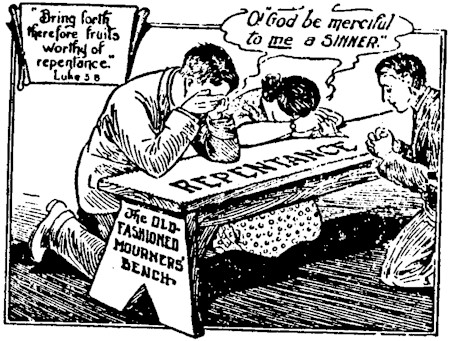...but ye are washed, but ye are sanctified, but ye are justified in the name of the Lord Jesus, and by the Spirit of our God. - 1 Corinthians 6:4
There is no need of Calvin, Arminius, Spurgeon, Luther, and Boice... Or any other name when the Holy Spirit is with us! If we have the Holy Spirit deep down in the heart... What is the need of assurance? If the Spirit of God dwells deep within, helped along by faith in the Lord Jesus, there is simply no need of mans input to help things along.
Pictured below is farmer I would work for in the hay field... Dallas would shout at work, shout in the hay field, and shout in church. He would also speak in tongues and run the aisles. He and his wife would operate a dairy farm and he would also work at the local ammunition plant. A very large soul his shouting would ring through the building. In the altar services he would kneel behind me in prayer and tears would roll off his cheek and onto my shoulders. A wonderfully large soul. Along with Dallas there were many others like him who would let the praises roll during church service. During the altar service old Evans Linkous used to weep like a baby. And if he were to look back to catch the amazed look in my eye he would weep, "The Holy Ghost! The Holy Ghost!" And point to all the souls being blessed around the altar. After I experienced these things for myself the people would make a fuss, or in the words of the Apostle Paul, glorify God in me.
Dallas.... Jesus in the family! What a happy home!

You can hear Dallas shouting in the background. Dallas, Gertrude, and Pastor Vaught have all went to glory.
And the old Merrimac Pentecostal Holiness church. I have never heard such singing , preaching, and shouting anywhere else in my entire life!

And all of these folks knew nothing of Calvin, OSAS, Arminius, Spurgeon, Luther, and Boice.
There is no need of Calvin, Arminius, Spurgeon, Luther, and Boice... Or any other name when the Holy Spirit is with us! If we have the Holy Spirit deep down in the heart... What is the need of assurance? If the Spirit of God dwells deep within, helped along by faith in the Lord Jesus, there is simply no need of mans input to help things along.
Pictured below is farmer I would work for in the hay field... Dallas would shout at work, shout in the hay field, and shout in church. He would also speak in tongues and run the aisles. He and his wife would operate a dairy farm and he would also work at the local ammunition plant. A very large soul his shouting would ring through the building. In the altar services he would kneel behind me in prayer and tears would roll off his cheek and onto my shoulders. A wonderfully large soul. Along with Dallas there were many others like him who would let the praises roll during church service. During the altar service old Evans Linkous used to weep like a baby. And if he were to look back to catch the amazed look in my eye he would weep, "The Holy Ghost! The Holy Ghost!" And point to all the souls being blessed around the altar. After I experienced these things for myself the people would make a fuss, or in the words of the Apostle Paul, glorify God in me.
Dallas.... Jesus in the family! What a happy home!

You can hear Dallas shouting in the background. Dallas, Gertrude, and Pastor Vaught have all went to glory.
And the old Merrimac Pentecostal Holiness church. I have never heard such singing , preaching, and shouting anywhere else in my entire life!

And all of these folks knew nothing of Calvin, OSAS, Arminius, Spurgeon, Luther, and Boice.




